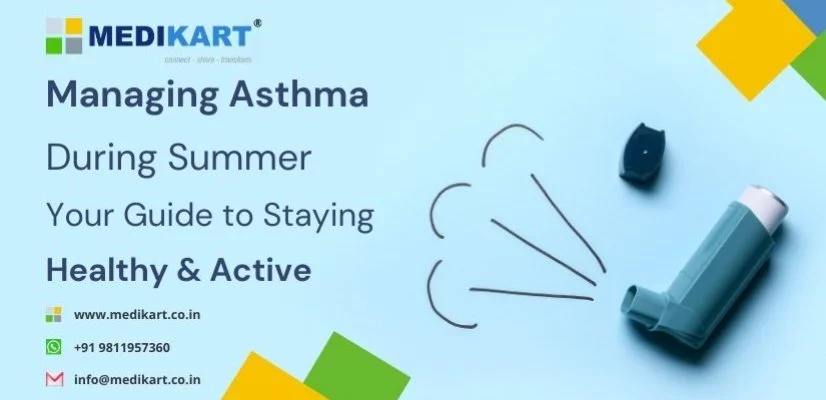As the warm weather of summer arrives, it’s important for individuals with asthma to take extra care in managing their condition. Asthma is a chronic respiratory condition that affects millions of people worldwide, and the summer season can bring unique challenges for asthma sufferers. In this blog, we will explore the symptoms of asthma, common triggers during summer, and discuss vital devices and tactics to help you stay healthy and active throughout the season.
Understanding Asthma Symptoms:
Asthma is characterized by inflammation and narrowing of the airways, leading to symptoms such as coughing, wheezing, shortness of breath, and chest tightness. These symptoms can vary in intensity and frequency from person to person. It is crucial to recognize and monitor these symptoms to effectively manage asthma during the summer months.
Common Triggers During Summer:
- Pollen: High pollen counts during summer can trigger asthma symptoms in individuals with pollen allergies. Keeping an eye on local pollen forecasts and taking precautions such as staying indoors during peak pollen times can help reduce risk.
- Air Pollution: Increased air pollution levels during the summer, especially in urban areas, can exacerbate asthma symptoms. Monitoring air quality indexes and avoiding outdoor activities on days with poor air quality can be beneficial.
- Heat and Humidity: Hot and humid weather can make breathing more difficult for people with asthma. The combination of heat, humidity, and pollutants in the air can trigger asthma symptoms. Staying hydrated and seeking cooler environments can provide relief.
Essential Devices for Asthma Management:
- Inhalers: Inhalers are a vital part of asthma management, delivering medication directly to the lungs. There are two main types: reliever inhalers, used during asthma attacks to provide quick relief, and preventer inhalers, taken regularly to control symptoms and reduce inflammation.
- Peak Flow Meters: Peak flow meters are handheld devices used to measure how well air moves out of the lungs. Regular monitoring of peak flow can help identify changes in lung function and indicate worsening asthma symptoms. It enables individuals to take appropriate action or consult a healthcare professional when necessary.
- Nebulizer: A nebulizer is a machine that converts liquid medication into a fine mist that can be inhaled through a mask or mouthpiece. It is commonly used for individuals who have difficulty using inhalers or during severe asthma attacks. Nebulizers can deliver both short-acting and long-acting medications.
- Allergy Medications: For individuals with asthma triggered by allergies, allergy medications such as antihistamines or nasal sprays can help alleviate symptoms. These medications work to reduce the body’s allergic response and can be particularly useful during periods of high pollen or other allergen risk.
- Air Purifiers: Air purifiers equipped with HEPA filters can help remove allergens, dust, and pollutants from the air, reducing potential asthma triggers indoors. Using an air purifier in your home can improve air quality and create a more asthma-friendly environment.
Staying Healthy and Active:
Despite having asthma, it is possible to stay active and enjoy the summer season. Here are a few tips to help you remain healthy and engage in physical activities:
- Follow Your Asthma Action Plan: Work closely with your healthcare provider to create a personalized asthma action plan. This plan will outline your medications, triggers, and steps to manage asthma symptoms effectively. Adhering to this plan will enable you to proactively respond to changing conditions and prevent asthma attacks.
- Warm-Up and Cool Down: Before engaging in physical activities, ensure that you warm up properly to prepare your body for exercise. Afterward, take time to cool down gradually to prevent sudden changes in breathing patterns and potential asthma flare-ups.
- Choose Suitable Activities: Opt for activities that are less likely to trigger your asthma symptoms. Individuals with asthma often tolerate swimming, walking, or indoor exercises in well-ventilated areas. Listen to your body and modify activities as needed.
- Be Prepared: Always carry your inhaler with you, especially when joining in strenuous activities or spending time outside. Ensure that your inhaler is easily accessible in case of an asthma flare-up. Additionally, inform your friends, family, or exercise partners about your condition, so they can provide assistance if needed.
- Stay Hydrated: Drinking an adequate amount of water helps keep your airways moist and can alleviate some asthma symptoms. Dehydration can make it harder to breathe, so it’s vital to stay hydrated, especially during hot summer days.
- Check the Air Quality: Before heading outside, check the air quality index in your area. Avoid exercising or spending continued periods outside on days when pollution levels are high or air quality is poor. Opt for indoor activities on those days to reduce risk to potential triggers.
- Protect Yourself from Allergens: If pollen allergies worsen your asthma symptoms, take precautions to minimize risk. Check pollen forecasts and try to stay indoors during peak pollen times. Keep windows closed, use air conditioning, and consider using allergen-proof bedding to reduce risk to dust mites.
- Seek Shade: When spending time outside during summer, seek shade to avoid prolonged risk to direct sunlight and heat buildup. Heat and humidity can trigger asthma symptoms, so finding cooler areas can provide relief and reduce the likelihood of an asthma flare-up.
Remember, everyone’s asthma triggers and management tactics can vary. It’s crucial to work closely with your healthcare provider to develop a personalized plan that suits your specific needs.
Conclusion: Managing asthma during the summer requires proactive measures to reduce triggers and maintain control over symptoms. Understanding your asthma symptoms, knowing summer triggers, and using vital devices like inhalers and peak flow meters help you stay healthy and active. Take precautions, stay hydrated, and choose suitable activities to enjoy summer while minimizing asthma flare-ups. Follow your action plan, seek medical guidance, and prioritize your well-being for a delightful summer.
Disclaimer
The information provided is for general knowledge only. Consult your doctor for personalized advice and treatment. Medikart HealthCare is not liable for any actions taken based on this info.

